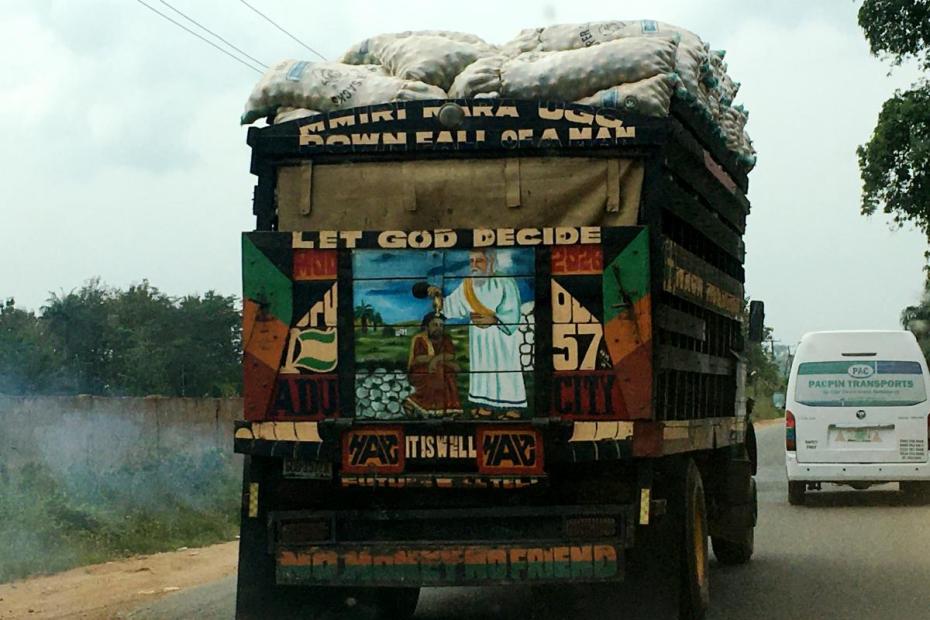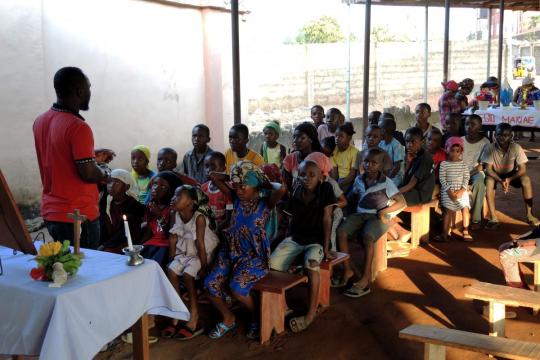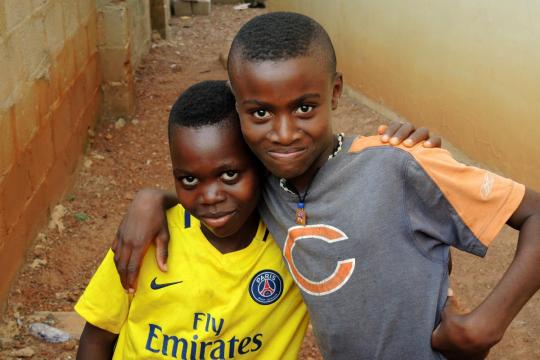Traditional Igbo society was built on a series of initiation rituals that spanned the whole course of life, from naming rituals after birth to funerals that were conceived as initiation into the realm of the ancestors. Each of these made the initiate more of a more full-fledged part of the community, conferring increasing prestige and responsibility.1 All had important educative functions.
“Initiation is not a matter of personal decision. It is the community that decides for the individual.”2 Yet to not be initiated has serious consequences. Being outside is a kind of death, in traditional terms; one cannot simply create and join a different community. “Among the traditional Igbo,” George Nnaemeka Oranekwu asserts, “the uninitiated is not only anonymous, he is equally ignonymous. He is ‘no body’ and belongs ‘no where’… He is not yet recognized as a complete human being.” No matter what his other accomplishments, he has no right “to appear in the traditional gathering of his kinsmen, or raise his voice in the gathering of the initiated.”3
To undermine and transform the worldview underlying traditional religion, Christian missionaries worked to eliminate or replace many initiation rituals. Some of those involving youth were undermined as Western education took young people from formative village apprenticeship contexts.4 By the 1980s Mary Steimel Duru concluded, “Since the arrival of the missionaries some of the ceremonies have disappeared while others have been adapted to a Christian setting. Some respondents explained that even though the original form of the rituals has changed, their inherent meaning remained.”5
The rites that do endure, after naming, include puberty rituals upon achieving adulthood (which could include initiation into masquerade societies, the male secret societies that moved about villages in masked costumes to dole out punishments and impose order); marriage; title-taking; and funerals.6
Some of the traditional rituals, like those surrounding the masquerade, are secret. There are severe penalties for those who reveal the secrets of the ritual or the identities of members.
Title-taking remains culturally important. The most prominent of the traditional title societies, the Ozo society, remains important in village life, and has proven to be a cultural sticking point. It is a very public, rather than secret, association. The achievement of an Ozo title confers high status, leadership, and responsibility in a particular community. Ozo titleholders, acting as a group, are the ultimate authority in a village. The title can be conferred only on highly regarded senior men.
For decades, the Church prohibited secret society membership and Ozo title holding. This has been an enduring source of tension because Ozo title holding is so important for village leadership and is considered by many people to be integral to their culture. Church bans against Ozo titles have been lifted in some parts of Igboland, with the understanding that the processes and the interpretation of the roles are stripped from their historic religious meaning.
The fascination for titles endures in other ways as well, ways that have not supplanted the local importance of Ozo titles, but effectively compete with it. Igbo people are quick to name and reference titles, and treat them with expansive significance in everyday life: barrister, professor, architect, and father. An array of religious, academic, professional and other titles are constantly referenced as yardsticks for achievement and status. Priests are not simply Father, but “Reverend Father,” and Sisters are “Reverend Sister.” Even “Seminarian” is a title. Laypeople are often quick to note who is the president, or secretary, or treasurer of an organization, or a program lists a person with “KSM” (Knights of St. Malumba) after his name. While membership in organizations is on the decline in many Western countries, Igbo society seems to have added a whole new layer of organizational opportunity.
That cultural focus on titles is likely one reason that there are as many seminarians, priests and sisters as there are. Clerical deference is powerful in Igboland, and traditional cultural norms of respect for title surely support that. It also carries over into lay organizations. In such a communitarian society, associating in lay Catholic organizations gives members the chance to mark the ways they have excelled and to take on the “reflected prestige from the glory of belonging to a particular group.”7
- 1George Nnaemeka Oranekwu, The Significant Role of Initiation in the Traditional Igbo Culture and Religion: An Inculturation Basis for Pastoral Catechesis of Christian Initiation (Frankfurt: IKO Verlag, 2004), 94.
- 2Oranekwu, The Significant Role of Initiation, 193.
- 3Oranekwu, The Significant Role of Initiation, 27-28.
- 4Ogbu U. Kalu, The Embattled Gods: Christianization of Igboland, 1841-1991 (Trenton & Asmara: Africa World Press, 2003), 264.
- 5Mary Steimel Duru, “Continuity in the Midst of Change: Underlying Themes in Igbo Culture,” Anthropological Quarterly 56, no. 1 (1983): 6.
- 6Oranekwu, The Significant Role of Initiation, 108-9.
- 7Frank A. Salamone, “Continuity of Igbo Values after Conversion: A Study in Purity and Prestige,” Missiology 3, no. 1 (January 1975): 33–43.


